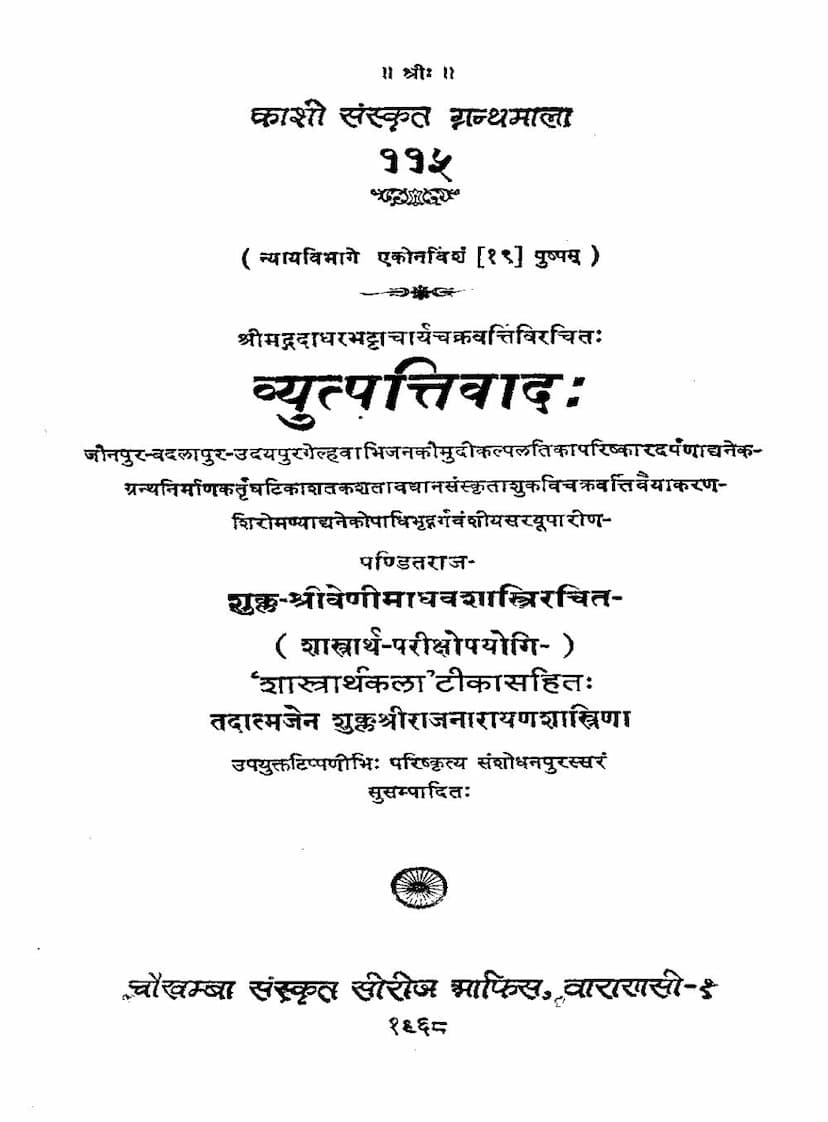Vyutpattivada Shastrarthakala Tika
Added to library: September 2, 2025

Summary
This is a summary of the Jain text "Vyutpattivada Shastrarthakala Tika" by Venimadhava Shastri, published by Chaukhamba Vidyabhavan.
I. Introduction and Context
- Author and Commentary: The book features the "Vyutpattivada" by Gadadhara Bhattacharya, accompanied by the "Shastrarthakala" commentary by Pandit Sri Venimadhava Shukla. The commentary is further refined with notes by Pandit Sri Rajanarayana Shukla.
- Significance of Vyutpattivada: Vyutpattivada (the theory of derivation) is a crucial text in the Nyaya (logic) and Vaisheshika schools of Indian philosophy. It is highly regarded for its profound exploration of the relationship between words and their meanings, and how linguistic understanding forms the basis of all valid knowledge and action.
- Purpose of the Commentary: Shastrarthakala aims to clarify the intricate concepts of Vyutpattivada, making it accessible for scholars and students involved in philosophical debates and textual analysis. It emphasizes the importance of understanding linguistic principles for grasping the core tenets of these philosophical traditions.
- Emphasis on Scripture: The text highlights the indispensability of scriptural knowledge (Veda) for understanding matters beyond empirical perception, particularly concerning spiritual liberation (Apavarga). It asserts that scripture, by its very nature, guides towards beneficial actions and abstinences.
II. Key Philosophical Themes Discussed in the Commentary (Based on the introductory and excerpted pages):
- The Nature of Shabda-bodha (Verbal Cognition): A significant portion of the commentary delves into the mechanics of shabda-bodha, the understanding derived from words and sentences. It discusses how the meaning of individual words combines to form the meaning of a sentence, emphasizing the roles of akanksha (syntactic expectancy), yogyata (semantic compatibility), and asatti (proximity) in creating coherent verbal cognition.
- Word Meaning and Derivation (Vyutpatti): The commentary scrutinizes the concept of vyutpatti, the process by which words acquire their meanings. This includes discussions on shakti (primary denotation) and lakshana (secondary denotation), and how these are understood and applied to derive meaning. The text contrasts different philosophical views, such as the Mimamsa school's understanding of word meaning, with the Nyaya perspective.
- Theories of Causation in Language: The text explores how words and sentences act as causes for knowledge. It touches upon the causal relationship between linguistic elements and the resulting mental states, particularly the shabda-bodha.
- The Role of Intention (Tatparya): The commentary emphasizes the importance of the speaker's intention (tatparya) in determining the final meaning of a sentence. It suggests that intention acts as a crucial factor in resolving ambiguities and establishing the intended meaning.
- Comparison of Philosophical Schools: The text engages in dialectical analysis, comparing the theories of Vyutpatti and Shabda-bodha as understood in different Indian philosophical schools, particularly Nyaya, Mimamsa, and Grammarian traditions.
- The Structure of Knowledge and Argumentation: The commentary implicitly highlights the logical structure of philosophical arguments, referencing concepts like pramana (means of valid knowledge) and the interrelation between linguistic understanding and epistemological certainty.
- Theological Context: While primarily a philosophical and linguistic treatise, the text begins with a salutation to Vishnu and Ramanuja, indicating a Vaishnava influence or context within which this philosophical exploration is undertaken.
- Editorial Aspects: The introduction mentions the meticulous editing and refinement of the text by Sri Rajanarayana Shukla, incorporating useful notes to enhance clarity and scholarly value.
III. Specific Concepts Mentioned (even if not fully elaborated in the provided excerpts):
- Shabda Pramana (Verbal Testimony): The text places significant importance on shabda pramana as a source of knowledge, especially for metaphysical and ethical truths.
- Causes of Shabda-bodha: The commentary likely details the specific factors (akanksha, yogyata, asatti, tatparya) that are necessary for the generation of verbal understanding.
- Critique of Mimamsa: There are indications of a critique of the Mimamsa school's interpretation of scriptural authority and word meaning.
- Refutation of Counterarguments: The commentary engages in refutations (khandana) of opposing viewpoints to establish the validity of its own philosophical position.
- Literary and Scholarly Merit: The commentary is praised for its clarity, depth, and the contributions of its annotator, highlighting its value for both academic study and personal enlightenment.
In essence, the "Vyutpattivada Shastrarthakala Tika" is a scholarly work that aims to illuminate the profound philosophical and linguistic theories presented in Gadadhara Bhattacharya's Vyutpattivada. It provides a detailed analysis of how we derive meaning from language, the essential components of verbal cognition, and the epistemological significance of scripture within the Indian philosophical landscape.